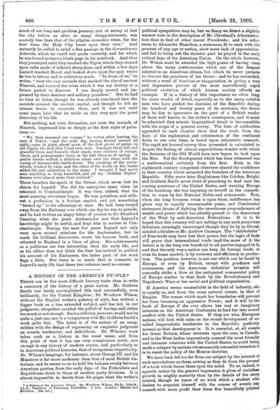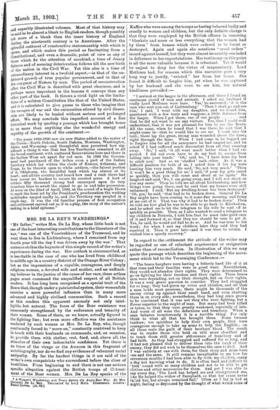A HISTORY OF THE AMERICAN PEOPLE.* THERE can be few
more difficult literary tasks than to write a summary of the history of a great nation. Mr. Goldwin Smith has lately accomplished this task successfully, even brilliantly, for the United Kingdom ; Dr. Woodrow Wilson, without the English writer's potency of style, has written a bigger book on a less extended subject, and has not, in our judgment, altogether avoided the pitfall of having said either too much or not enough. Such acriticism, however, would not be quite a just one, nor is a comparison with Mr. Goldwin Smith's work quite fair. The latter is of the nature of an essay, written with the design of expressing an emphatic judgment on events, tendencies, and individuals. Dr. Wilson's work takes rank as a history in the usual sense, and from this point of view it has one very conspicuous merit, rare enough in any history of modern events, and particularly so in American political histories, that of scrupulous impartiality. Dr. Wilson's language, for instance, about George III. and his Ministers is far more moderate than that of most British his- torians, and he seems to us to hold the balance evenly between American parties, from the early days of the Federalists and Republicans down to those of modern party divisions. It is almost impossible to decide from his pages what the writer's • A History of the American People. By Woodrow Wilson, Ph.D., Litt.D., LL.D., President of Princeton University. 5 vols. London: Harper and brothers. [8OL net.] political sympathies may be, but we fancy we detect a slightly warmer tone in the description of Mr. Cleveland's Administra- tion than in that of other recent Presidents ; and his refer- ences to Alexander Hamilton, a statesman fit to rank with the greatest of any age or nation, show some lack of appreciation and fail to bring out the decisive part he played in the early critical days of the American Union. On the whole, however, Dr. Wilson must be awarded the high praise of having risen above the many controversies which are of the deepest interest to an American citizen, but which he never permits to obscure the greatness of his theme ; and he has succeeded, without a word of bombast or exaggeration, in giving a true and impressive picture of the most marvellously rapid political evolution of which human society affords an example. If in a history of this importance we often long for more wealth of detail, especially as to the many notable men who have guided the destinies of the Republic during the hundred and twenty years of its existence, the desire may be due to ignorance on the part of a British reader of facts well known to the writer's countrymen, and it must be admitted that minute biographical detail is incompatible with the scope of a general survey. The lists of authorities appended to each chapter show that the work, from the days of the exploration and colonisation of the continent down to our own time, is based upon exhaustive research. The rapid yet learned survey thus presented is calculated to deepen the feeling of almost superstitious wonder with which the denizens of the Old World have now begun to look upon the New. Yet the development which has been witnessed was a mathematical certainty from the first. Even in the eighteenth century competent observers shared the confidence in their country which animated the founders of the American Republic. Fifty years later Englishmen like Cobden, Bright, and Goldwin Smith never tired of preaching to deaf ears the coming greatness of the United States, and warning Europe of the handicap she was imposing on herself in the competi- tion to come by her National Debts and armaments. Now, when the long foreseen crisis is upon them, indifference has given way to equally unreasonable panic, and Continental statesmen dream of fighting the unwelcome preponderance of wealth and power which has silently passed to the democracy of the West by anti-American Federations. It is to be hoped that this country will not indulge in any such pernicious delusions, seemingly encouraged though they be by so liberal- minded a thinker as Mr. Andrew Carnegie. The " shibboleths" of Free-trade may have lost their power, but the logic of facts will prove that international trade (and the more of it the better) is in the long run beneficial to all parties engaged in it, and that the only way a nation can keep its foreign trade, or even its home market, is by economy and efficiency in produc- tion. The position, however, is not one which can be faced by Europe, or even by Britain, except with prudence and seriousness, and the American industrial invasion will assuredly strike a blow at the antiquated commercial policy of Europe similar to that dealt by the Revolutionary and Napoleonic Wars at her social and political organisation.
If America seems unassailable in the field of industry, she is equally so, and from the same natural causes, in that of Empire. The oceans which mark her boundaries will prevent her from becoming an aggressive Power; and it will be the fault of Europe if she ever allows her real or imaginary interests on the American Continents to lead her into armed conflict with the United States. If they are wise, European nations will look with calm on the recent development of so- eslled Imperialistic tendencies in the Republic, perfectly normal as that development is. It is essential, at all events for Great Britain, whose interests upon the seas, in Canada, and in the West Indies imperatively counsel the most friendly and intimate relations with the United States, to avoid being made a catspaw by nations whose scarcely concealed intention it is to resist the policy of the Monroe doctrine.
We have been led too far from our subject by the interest of such speculations as these, arising as they do from the perusal of a book which forces them upon the mind. To us, indeed, it appeals rather by the general impression it gives of resistless growth to mighty maturity than by the details of the story related, though we know of no work which a student who desires to acquaint himself with the course of events can consult with more profit than these five beautifully printed
be said to be almost a blank to English readers, though possibly not more of a blank than the inner history of England during the nineteenth century is to Americans. After the splendid outburst of constructive statesmanship with which it epos, and which makes this period as fascinating from a
Constitutional, and even a dramatic, point of view as any of those which fix the attention of mankind, a time of dreary flatness and of seeming deterioration follows till the new birth of the nation in the Civil War. Yet this also is a time of extraordinary interest in a twofold aspect,—in that of the un- fettered growth of true popular government, and in that of the conquest of Nature by man. The period of reconstruction after the Civil War is described with great clearness, and is perhaps more important in the lessons it conveys than any other part of the book. It throws a vivid light on the limita- tions of a written Constitution like that of the United States, and it is calculated to give pause to those who imagine that the ravages of war and the animosities stirred by civil dissen- sion are likely to be healed without serious and prolonged effort. We may conclude this imperfect account of a fine historical work by quoting a passage which has brought home to us more than anything else the wonderful energy and rapidity of the growth of the continent
The years 1889-1890 saw six new States added to the roster of the Union—North Dakota, South Dakota, Montana, Washington, Idaho, and Wyoming—and thoughtful men perceived how sig- nificant a thing it was that but five Territories remained in all the broad continent, with scattered Reservations here and there in the farther West set apart for red men. In 1889 the Govern- ment had purchased of the tribes even a part of the Indian Territory which lay within the circle of Kansas, Arkansas, and Texas, to be thrown open to white settlers,—the fairest portion of it, Oklahoma, the beautiful land which lay almost at its heart; and all the country had heard how mad a rush there had been across its borders to secure its coveted acres. A host of settlers fifty thousand strong had encamped upon its very boundary lines to await the signal to go in and take possession. At noon on the 22nd of April, 1889, at the sound of a bugle blown to mark the hour set by the President's proclamation the waiting multitudes surged madly in, and the Territory was peopled in a single day. It was the old familiar process of first occupation and settlement carried out as if in a play, the story of the nation's making in a brief epitome."











































 Previous page
Previous page